The Notre Dame Fire Revisited: A Year of Setbacks and Adaptations in Paris
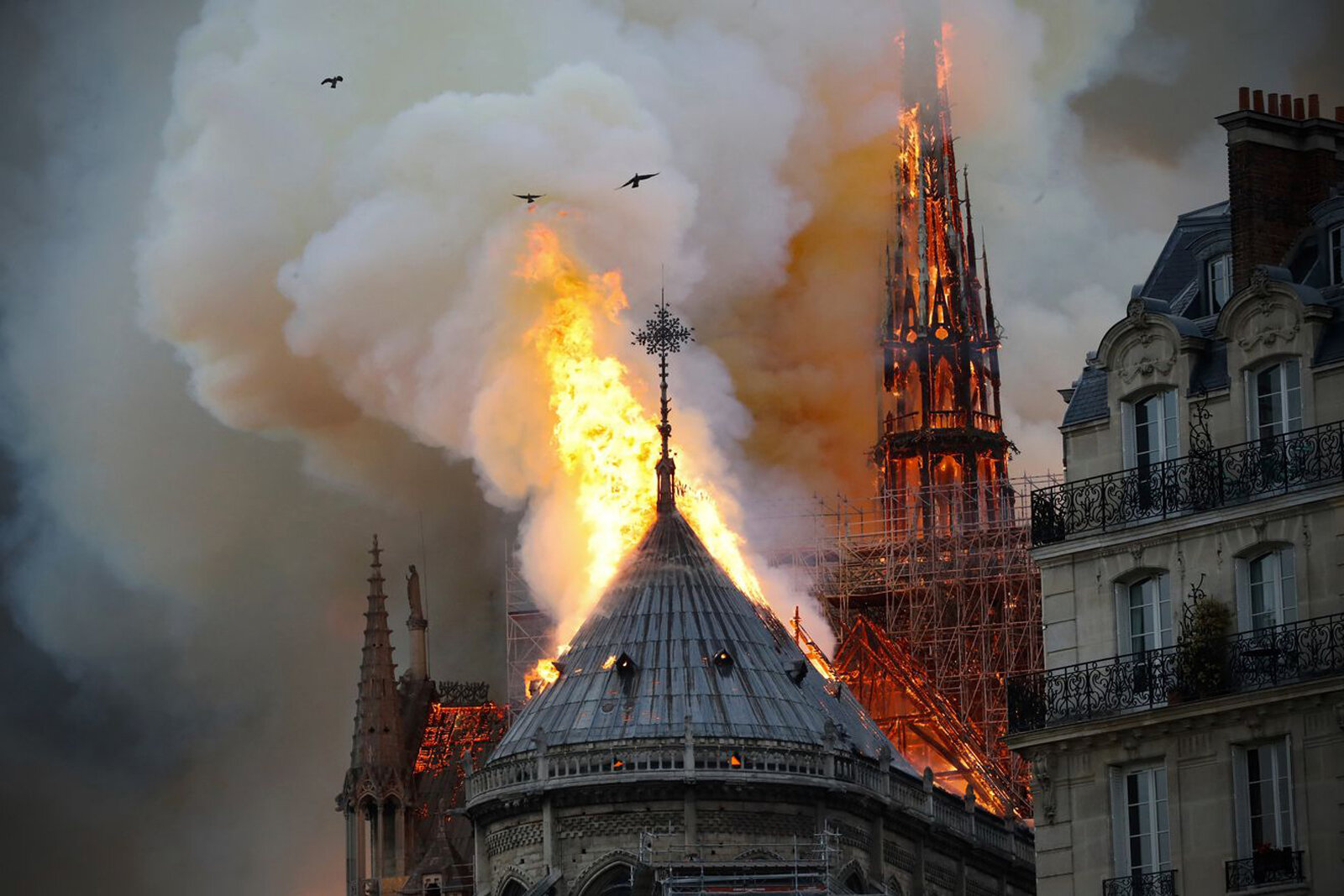
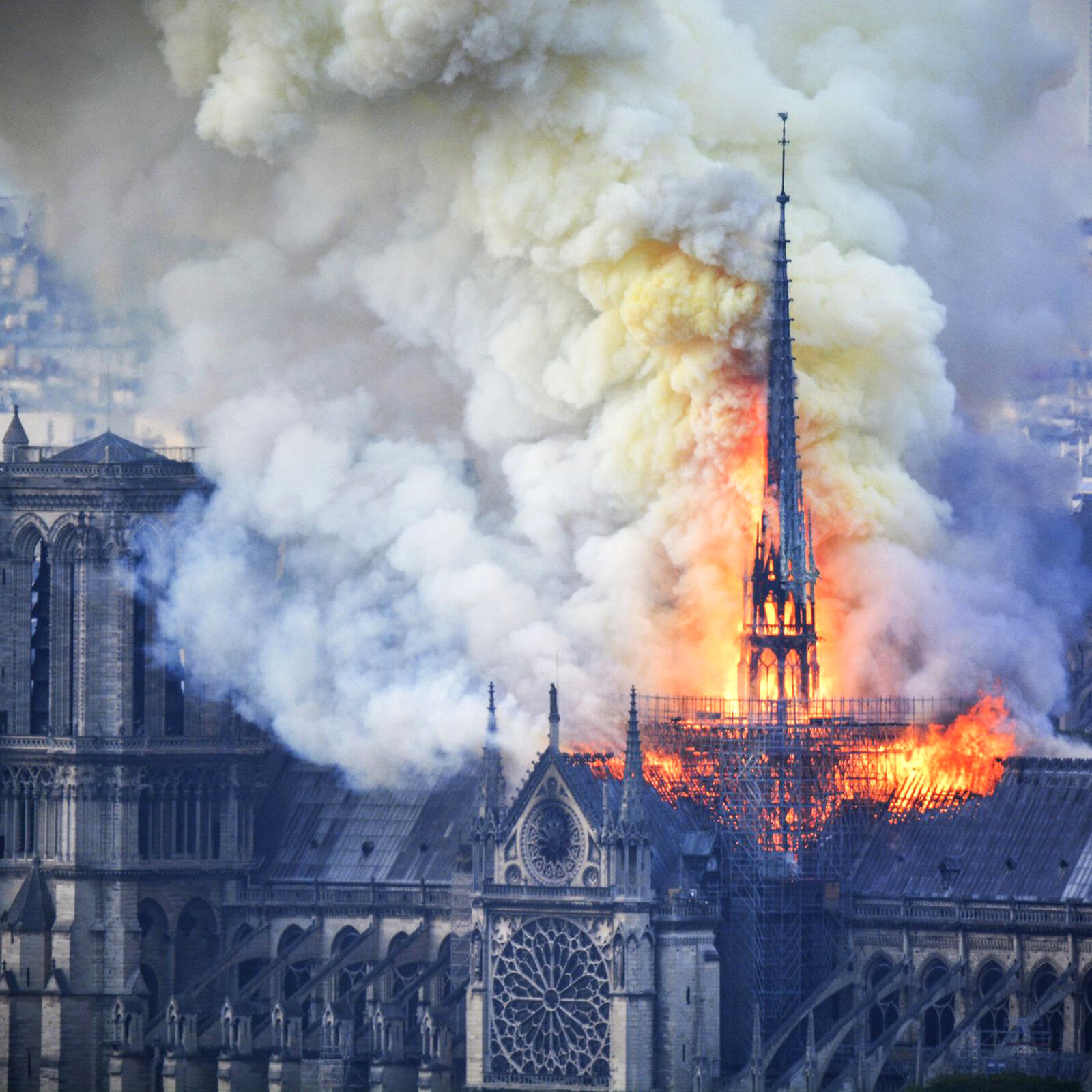
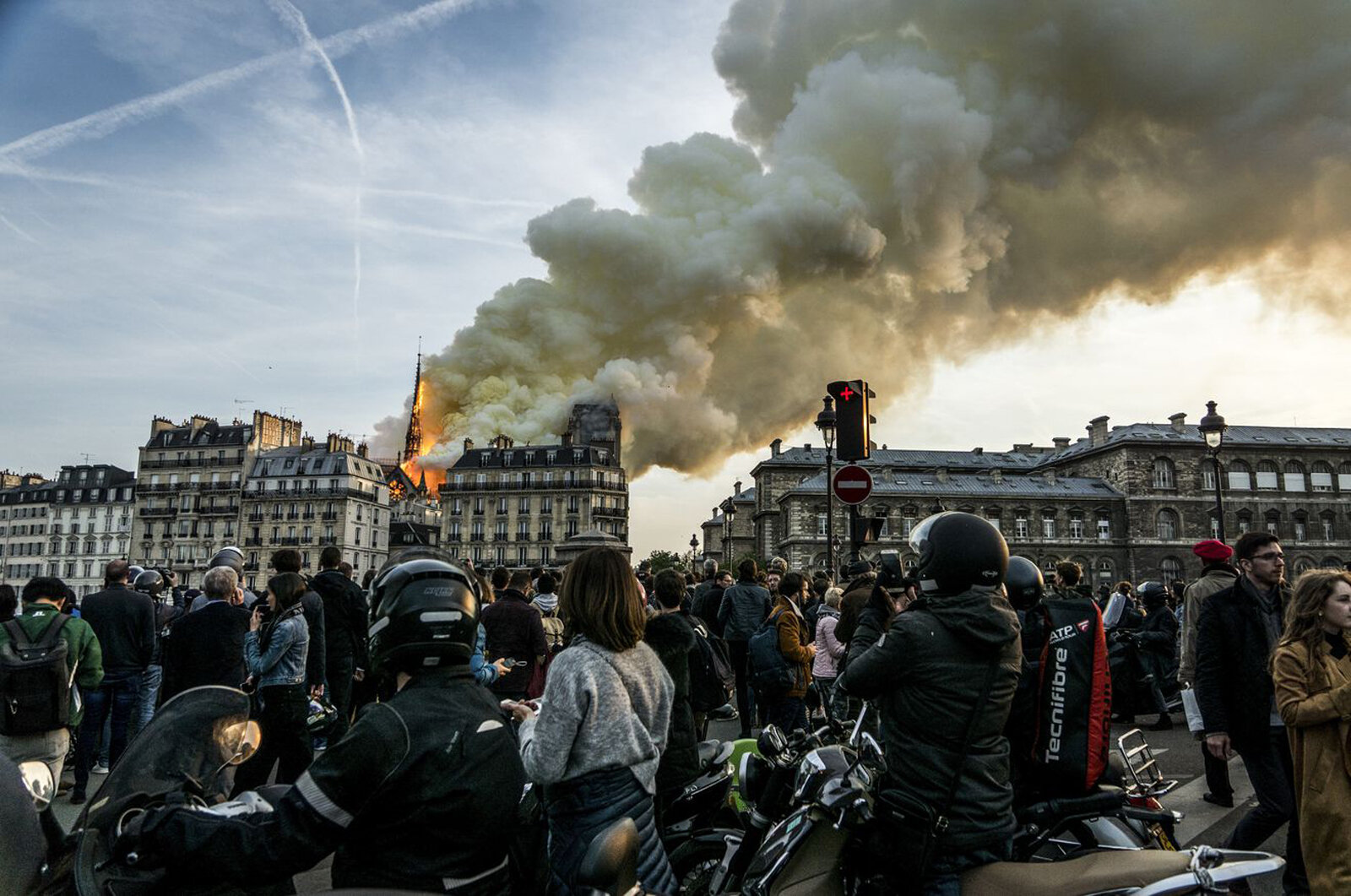
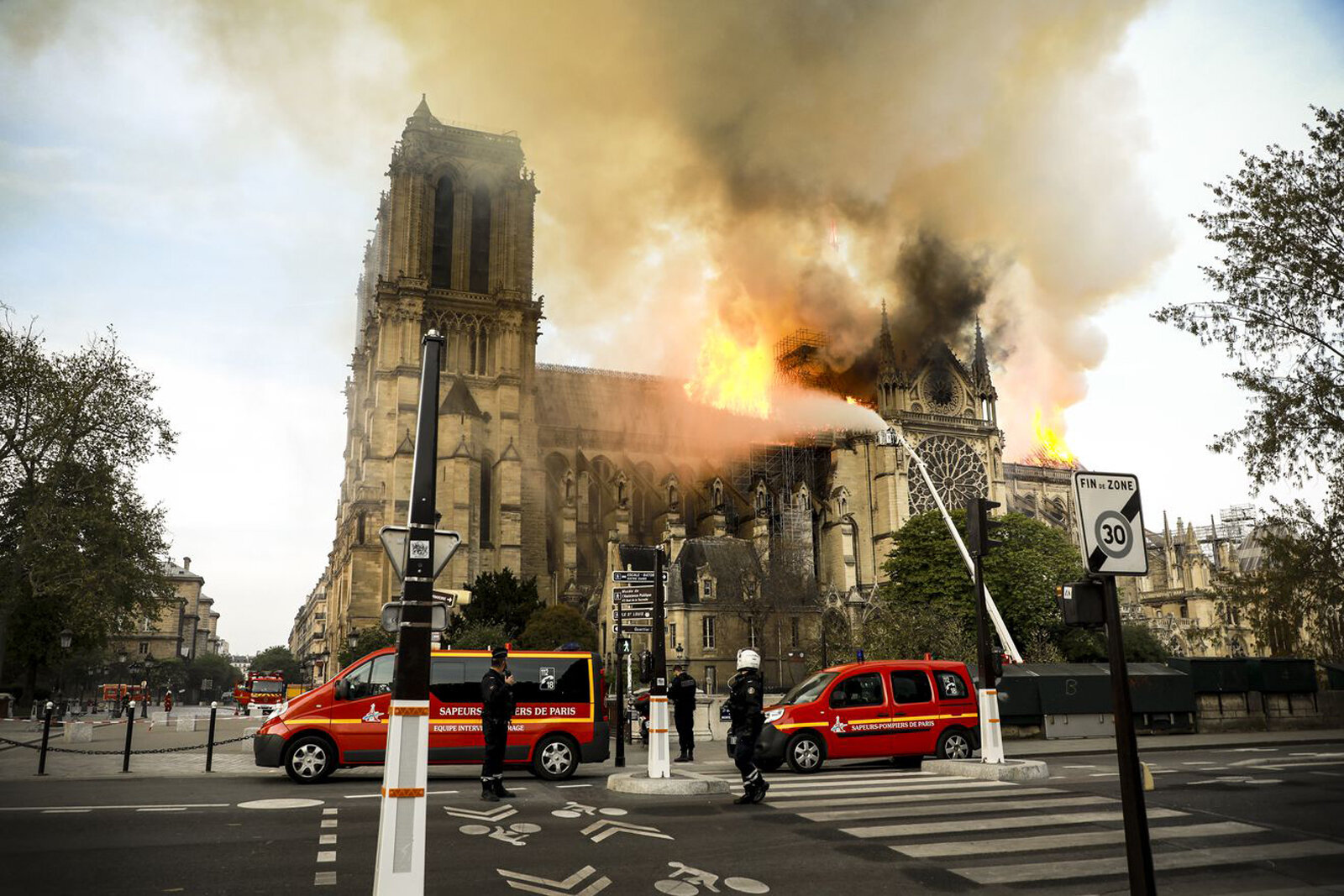
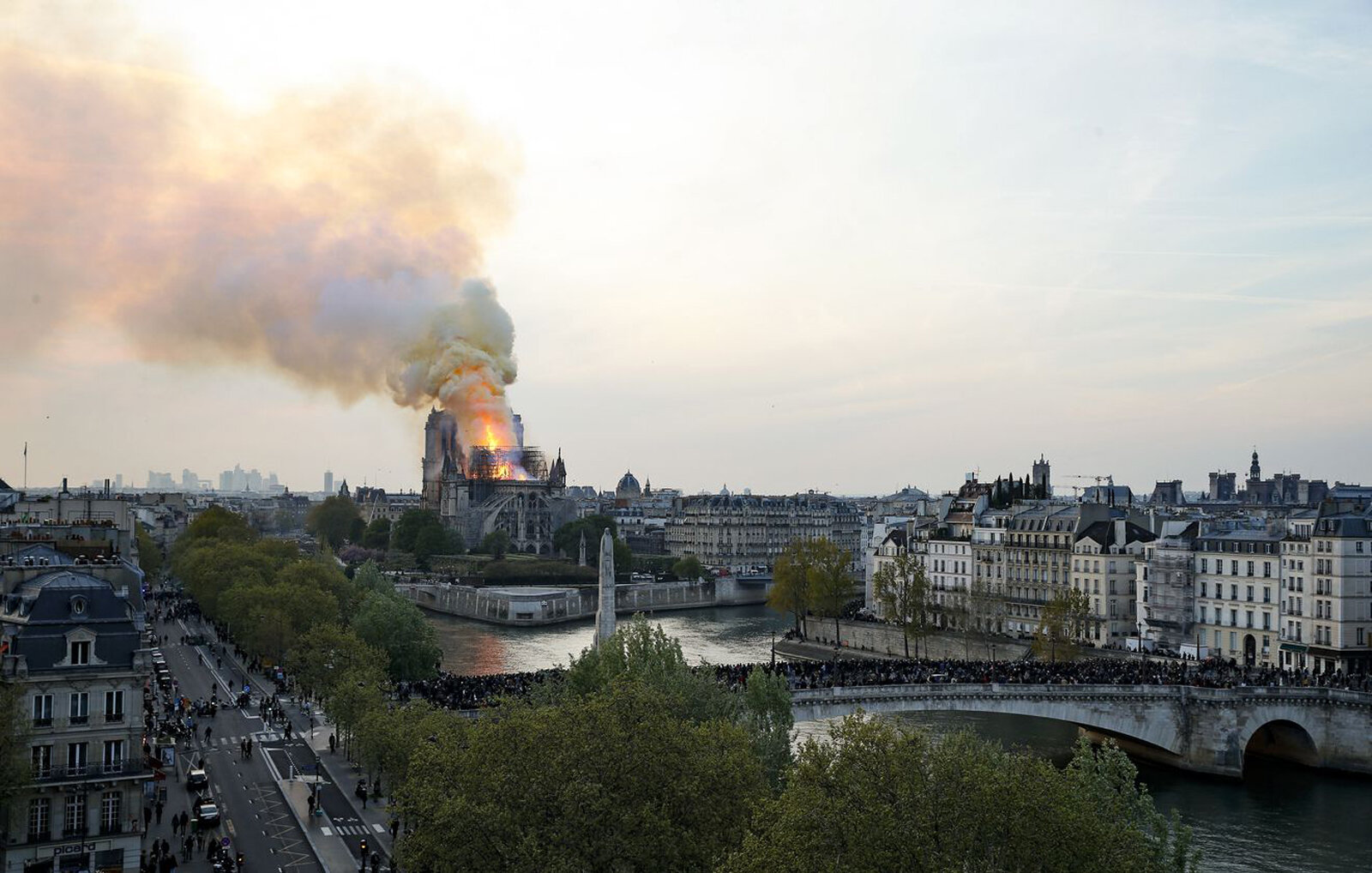
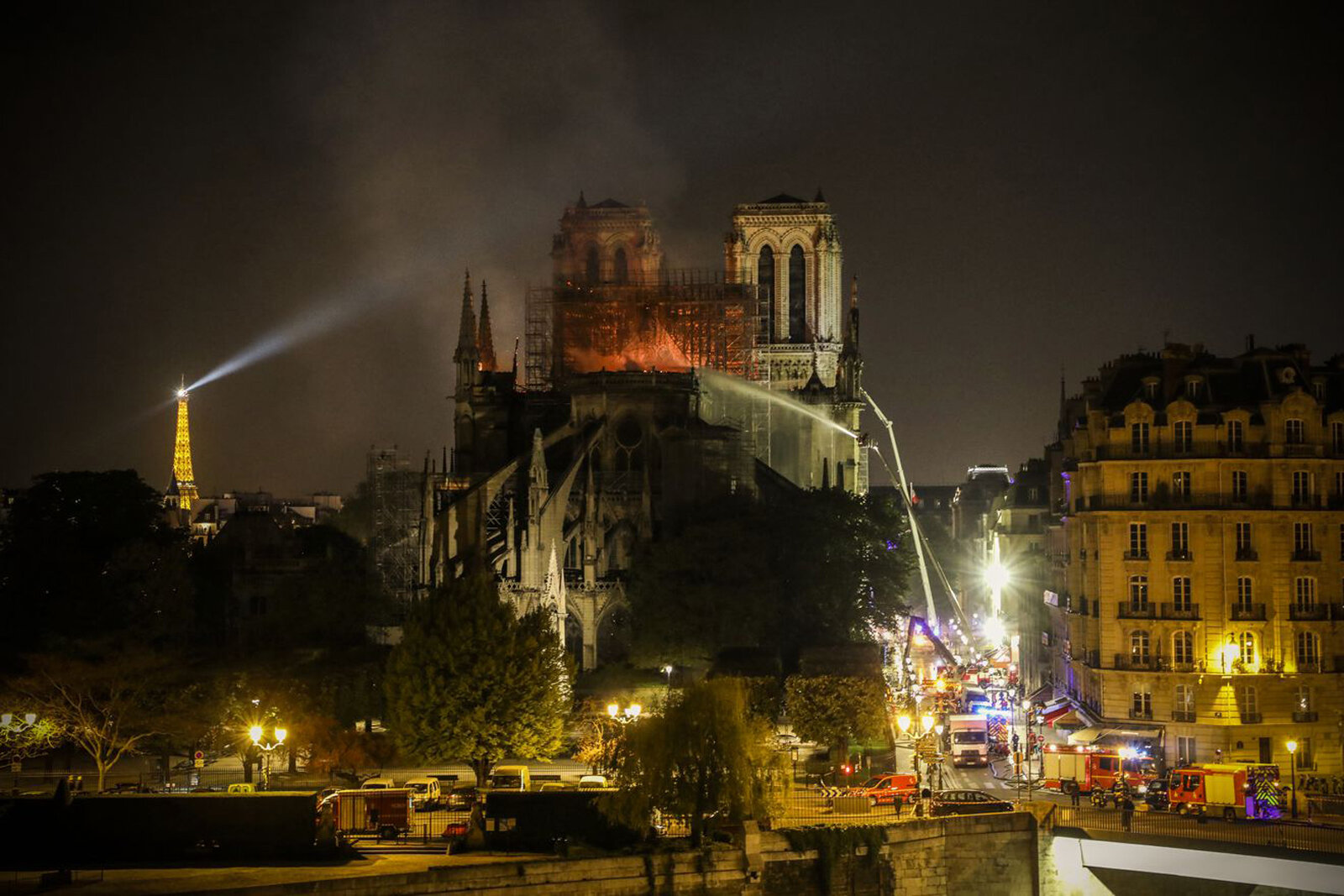
It’s a sign of strange times when only seven people dressed in hazmat suits attend Notre Dame’s Good Friday Service. But lately in Paris, strange times have become the norm. While today marks the one-year anniversary of the Notre Dame fire, which nearly sent the centuries-old cathedral to its knees, it is also the day that Paris’ COVID-19 confinement was meant to be lifted (now extended to May 11). All the while, we’ve had routine police clashes and months-long pension strikes, resulting in trash piling up on the streets and a complete disruption of the public transportation system. It was my first year living in France, and one might say it’s been “historical.”
In light of our current global health crisis, the Notre Dame fire seems lightyears away in terms of time and relevance. But as I think back on it—I was working across the street when it happened—that night’s fear and confusion doesn’t seem to contrast what many Parisians are feeling now. And while I don’t want to condescend a crisis, it’d be a lie to say I have not experienced a palpable beauty and camaraderie growing from the chaos of this past year’s events.
Photos courtesy of Julia Naman.
More than two weeks before Notre Dame caught fire, I moved into Shakespeare and Company (yes, literally inside the bookshop), perhaps the world’s most famous bookstore located in the heart of Paris. I came to Paris the way every aspiring writer moves to Paris: with a one-way ticket, a single suitcase and a guitar, and no concrete plans. The goal was to “Tumbleweed” (both verb and noun); a program where, in exchange for a few hours’ work each day, traveling writers (Tumbleweeds) can live in the shop for free. There are only three spots, and there is no application or waitlist. The only way to become a Tumble is to show up and ask. The concept is both risky and romantic enough to attract endless bohemian writers to its doorstep. So, it felt like an absolute miracle when, on my first attempt, I got a spot.
Shakespeare and Company is situated in “Kilometre Zero”—the distance from what is considered the exact center of Paris, or Notre Dame. At night in the Tumbleweed studio, I would fall asleep face-to-face with the cathedral which, at that time, stayed lit up all evening. On the window was a chalk portrait of Virginia Woolf. At first it was hard to sleep, with the brightness of Notre Dame, Woolf’s gaze, and my excitement that James Baldwin and Allen Ginsberg (along with 30,000 others) had shared this same experience. It was just the beginning of what would turn into my year in Paris, one that I and the rest of the world won’t soon forget.
Last year, Tuesday, April 15, the day the fire caught, I was reading in the studio. Tumbleweeds are expected to read one book per day, with ambiguous levels of success and accountability. Either the book was captivating, or maybe—I thought guiltily afterward—I’d grown so used to the view that I stopped looking out, because I had no clue there was a fire until my 7 p.m. shift. I asked one of the booksellers what he needed. He told me (with a tremor in his voice so melodramatic I laughed until I saw he wasn’t kidding) to, “Go and watch history burn.”
Virginia Woolf’s profile stands guard in the foreground as the Notre Dame burns.
A mass of spectators crowded the front of the shop. At this point, the scaffolding on the roof was on fire. The two other Tumbleweeds were at a nearby laundromat and rushed back when they saw the flames; I think something can still contain humor without being funny at all, and that's how I felt about seeing them in a wordless stupor, sprinting toward me with bags of wet clothes on their backs. The plumes of smoke were a bizarre mix of yellow and brown. When scorched china berry blossoms began landing in front of us, we closed the shop.
At the time, no one knew how the fire began. With the 2015 Paris Attacks still fresh, it was easy to assume that the 850-year-old cathedral did not catch fire by accident—though, as it turns out, it did. Even more, there was fear that the scaffolding would fall and cause the whole building to collapse. If that happened, the flames would likely catch on top of the building we were in, or so was explained to me by a guest author of Shakespeare and Co. as he readjusted the settings on his Nikon.
Once the back spire fell, raising a collective cry of agony and camera shutter clicks, I was done standing watch to the catastrophe. Instead I walked to a friend’s house close by, though several roads were blocked off to prevent people gathering. That evening, we could hear the bells of the nearby churches ringing. Throughout the night people gathered in the streets to sing and pray, sparking citywide unity and candlelit vigils the following night. Less than a week later, there would be no public Easter mass, nor would Notre Dame host a Christmas service for the first time since the French Revolution. But even stranger is to think that this year, Paris spent Easter without any public masses.
A few months after the fire, I moved out of the bookshop and took a job as a music teacher in the ninth arrondissement. In early December, the General Confederation of Labor (CGT) unions shut down public transport in response to President Macron’s new comprehensive pension plan. Suddenly, the canal near my apartment was slammed with pedestrians and bicyclists. In the same, crazed spirit of makeshift face masks we’re seeing right now, people came up with creative solutions for transportation. On my 30-minute ride to work I saw a pair of scowling businessmen sharing a bike, one on the handlebars. Bus riders became hitchhikers; drivers often pulled up to bus stops to announce which directions they were headed and how many people they could take. One ambitious day I rode a skateboard to French class. It ended up taking much longer than just walking, especially because each time I fell I would share a good, humiliating laugh with whoever happened to be passing by. Fortunately it was a mild winter, so there was no snow. But on rainy days I’d pack a change of clothes, arriving to work soaked and shivering. “Desperate times,” as they say.
In the midst of this were the protests. I taught near Gare du Nord, the main train station in Paris where most of the transportation strikes occurred (that is a hopeful use of the past tense). One of my responsibilities was to walk the children five minutes between two different schools. But when more than 100,000 protesters were shouting on the next block, clashing with the police and getting tear-gassed, it posed a challenge to keep the five-year-olds calm.
Once the metros were back up and running at the end of January, there was citywide liberation, giving little care to the trash that would soon overflow in the streets due to waste management strikes. The mass protests continued up until March 8, despite the then-ban on gatherings over 1,000 people due to the rising Covid-19 pandemic. (Doesn’t 1,000 people seem like an absurdly high number now?) That week, my mom had planned a trip to Paris to visit me. Already the city seemed to be shutting down organ by organ; the museums were slowly closing, and the marathon I’d trained for was postponed. Still, we celebrated my mother’s arrival at Le Grand Colbert (yes, because of Diane Keaton). Halfway through the meal our waiter came up, deadpan, and announced that starting at midnight, all restaurants and non-essential businesses would close indefinitely in Paris. He suggested we order a dessert because “it would be our very last chance.” (Akin to: “Go and watch history burn.”) Not knowing what to do, we split the crème brûlée.
Two days later on March 16, the confinement was announced, and an attestation form detailing our reasons for leaving the apartment was required to go outside. It was a bizarre adjustment for everyone. My elderly neighbor, always so warm (though I rarely understand his French), shouted at me to stay away when I went to take out the trash: Approchez pas! Approchez pas! In other circumstances, however, strangers seemed kinder. At this point daytime jogging was still allowed, and as I passed “the regulars” on the canal, people I’ve seen for the past six months but never acknowledged, this time we all waved to each other. Being stuck in my apartment was obviously not the Parisian vacation of my mother’s dreams, and yet the simplest things filled us with gratitude, like the local boulangerie that stayed open. When we discovered they had a cappuccino maker, we were downright fous de joie. At 8 p.m. each night, the entire city would cheer out their windows for the healthcare workers fighting the virus. And just as much, I would say, to acknowledge and support one another in confinement. While Parisians can’t physically “gather together” now like for the Notre Dame vigils, each night a pulse of solidarity and community courses through the city.
After a few days, the jogging path on the canal—not long before crammed with bicycling commuters during the strikes—was blocked off with barricades to prevent people from gathering. Meanwhile my mother and I were sharing a bed in my small apartment, and seeing this as perhaps the indefinite foreseeable future, we decided to catch one of the last commercial flights to California. I packed only a carry-on. Now that we are “home,” bunkered down like most of the world, I keep getting asked when I’m going back. I tend to answer inaccurately: “when things return to normal.” That sentence, however, means nothing. “Normal” is a state never defined until it is disrupted. Perhaps I should think of “life after Covid” the way I think of Notre Dame’s restoration: while we trust that she will be rebuilt, we also accept that she will never be the same.
Rather than focusing on the catastrophe of the April 15th fire, today I will remember the hope of the next morning, learning that against all odds, Notre Dame had not collapsed. Now, going on weeks-long confinement, we are still in the darkness of the Covid crisis. But eventually “the next morning” will come. And when we reemerge and check the damages, I have no doubt that we too will find ourselves still standing.
The author on her last day as a Tumbleweed at the famed Shakespeare & Co. bookshop across the street from the Notre Dame.


